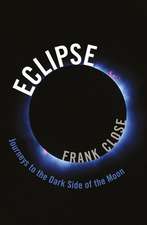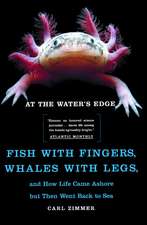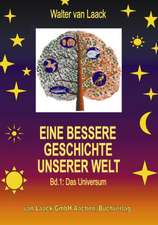Making Eden: How Plants Transformed a Barren Planet
Autor David Beerlingen Limba Engleză Hardback – 28 mar 2019
Preț: 122.69 lei
Preț vechi: 146.16 lei
-16% Nou
Puncte Express: 184
Preț estimativ în valută:
23.48€ • 24.51$ • 19.43£
23.48€ • 24.51$ • 19.43£
Carte disponibilă
Livrare economică 03-10 martie
Livrare express 27 februarie-05 martie pentru 54.46 lei
Preluare comenzi: 021 569.72.76
Specificații
ISBN-13: 9780198798309
ISBN-10: 019879830X
Pagini: 272
Ilustrații: 30 black and white images, 8 pp colour plates
Dimensiuni: 163 x 242 x 27 mm
Greutate: 0.51 kg
Editura: OUP OXFORD
Colecția OUP Oxford
Locul publicării:Oxford, United Kingdom
ISBN-10: 019879830X
Pagini: 272
Ilustrații: 30 black and white images, 8 pp colour plates
Dimensiuni: 163 x 242 x 27 mm
Greutate: 0.51 kg
Editura: OUP OXFORD
Colecția OUP Oxford
Locul publicării:Oxford, United Kingdom
Recenzii
Beerling asks the reader to imagine a world without plants as a starting point to the 450 or so million-year journey that unfolds through the pages. This is his manifesto for botany and he is a good advocate for the field.
Few authors have attempted a summary of early plant evolution for a general audience... Beerling is a fount of information.
Scholarly, highly readable and passionate account ... This book is a call-to-arms: cutting-edge plant science in an environmental context.
[A] wonderful study ... A vivid corrective to deep-rooted zoo-chauvinism in thinking about life on Earth.
David Beerling demonstrates his proficiency in all things green by exploring facets of the colonisation of land by plants in times long past.
Subtitled 'how plants transformed a barren planet' this fascinating book describes the rise and diversification of plant life originating in a certain type of algae and gradually colonising the land, leading eventually to large forests that impacted the climate through feedback mechanisms.
Relatively complex subjects within the field of planet genetics are presented in detail, yet in an accessible writing style that should appeal to non-specialists... Thoroughly researched, content-heavy, and scattered with anecdotes and examples from Beerling's own career ... an informative and highly relevant read.
Making Eden is an amazing story that is very well told by David Beerling. It should be on the reading list of every course in plant biology. It should also be essential reading for all those in positions of influence regarding current and future agriculture and environmental policies.
David Beerling takes the reader through the latest scientific advances with both deep knowledge and skilful writing. Plants have shaped the rest of the biological world. He explains why, far from being a nineteenth century science, Beerling explains why botany should lie at the centre of debates about how we deal with the future of the biosphere.
Beerling shows us that plants made our planet habitable, and that the fates of people and plants are inextricably intertwined. Against this billion-year backdrop we should think carefully about whether hubris or humility is the better guide for navigating an uncertain planetary future.
'Making Eden' is a sweeping history of plant evolution that demonstrates both the development and fragility of plant life. Sound and alluring, it exposes readers to phenomena like the remarkable complexity of plants, the genetic commonality that enables an incredible variety of flowers, and the fascinating biological secret behind the resilience of redwood trees that flourish despite their immense size.
This book does exactly what David Beerling promises in the sub-title - it explains with clarity and passion the extraordinary story of how plants escaped from their ancestral marine habitats and came to dominate terrestrial ecosystems. He also brings to life vividly the huge impact this has had, and continues to have, on all life on earth (including our own) and how we, Homo sapiens, are now threatening our own future existence by the damage we are inflicting on earth's increasingly degraded and fragile ecosystems.
Few authors have attempted a summary of early plant evolution for a general audience... Beerling is a fount of information.
Scholarly, highly readable and passionate account ... This book is a call-to-arms: cutting-edge plant science in an environmental context.
[A] wonderful study ... A vivid corrective to deep-rooted zoo-chauvinism in thinking about life on Earth.
David Beerling demonstrates his proficiency in all things green by exploring facets of the colonisation of land by plants in times long past.
Subtitled 'how plants transformed a barren planet' this fascinating book describes the rise and diversification of plant life originating in a certain type of algae and gradually colonising the land, leading eventually to large forests that impacted the climate through feedback mechanisms.
Relatively complex subjects within the field of planet genetics are presented in detail, yet in an accessible writing style that should appeal to non-specialists... Thoroughly researched, content-heavy, and scattered with anecdotes and examples from Beerling's own career ... an informative and highly relevant read.
Making Eden is an amazing story that is very well told by David Beerling. It should be on the reading list of every course in plant biology. It should also be essential reading for all those in positions of influence regarding current and future agriculture and environmental policies.
David Beerling takes the reader through the latest scientific advances with both deep knowledge and skilful writing. Plants have shaped the rest of the biological world. He explains why, far from being a nineteenth century science, Beerling explains why botany should lie at the centre of debates about how we deal with the future of the biosphere.
Beerling shows us that plants made our planet habitable, and that the fates of people and plants are inextricably intertwined. Against this billion-year backdrop we should think carefully about whether hubris or humility is the better guide for navigating an uncertain planetary future.
'Making Eden' is a sweeping history of plant evolution that demonstrates both the development and fragility of plant life. Sound and alluring, it exposes readers to phenomena like the remarkable complexity of plants, the genetic commonality that enables an incredible variety of flowers, and the fascinating biological secret behind the resilience of redwood trees that flourish despite their immense size.
This book does exactly what David Beerling promises in the sub-title - it explains with clarity and passion the extraordinary story of how plants escaped from their ancestral marine habitats and came to dominate terrestrial ecosystems. He also brings to life vividly the huge impact this has had, and continues to have, on all life on earth (including our own) and how we, Homo sapiens, are now threatening our own future existence by the damage we are inflicting on earth's increasingly degraded and fragile ecosystems.
Notă biografică
David Beerling is the Sorby Professor of Natural Sciences, and Director of the Leverhulme Centre for Climate Change Mitigation at the University of Sheffield. Before this he held a Royal Society University Research Fellowship, where his work on the evolution of life and the physical environment was recognised by the award of the prestigious Philip Leverhulme Prize in earth sciences in 2001. He has published numerous articles in academic journals and is the author of The Emerald Planet (OUP, 2007). This book formed the basis of a major three-part BBC Two television series, How to Grow a Planet. He was elected to the Fellowship of the Royal Society, London, in 2014.



















